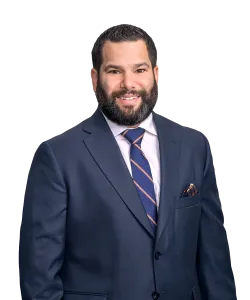SBA Survey Unfairly Targets COVID-19 Relief Borrowers
*This Article Was Originally Published By Law360
On October 30, the US Small Business Administration quietly and without alerting borrowers, circulated to Paycheck Protection Program lenders a draft questionnaire titled “Paycheck Protection Program — Loan Necessity Questionnaire (For-Profit Borrowers).”
As part of their initial PPP application, borrowers were required to certify that “[c]urrent economic uncertainty makes this loan request necessary to support the ongoing operations of the Applicant.” The stated purpose of the questionnaire is to enable SBA loan reviewers to evaluate that a borrower’s necessity certification concerning their economic uncertainty was made in good faith.
The questionnaire is targeted at for-profit borrowers who received PPP loans with an original principal amount of $2 million or greater. If the questionnaire is implemented, those borrowers would be required to complete this form and submit it to their lender, along with supporting documents, within 10 business days of receipt.
The questionnaire again raises the specter that the SBA is going to heavily scrutinize the necessary certification and other certifications that PPP borrowers made in their PPP applications, as to a borrower’s need for a large PPP loan at the time of its PPP application, which was in most cases near the beginning of the COVID-19 pandemic.
The questionnaire seems to be a way for the SBA to build a case against a borrower with the benefit of hindsight. Where the borrower was not as affected by the pandemic as badly as initially feared, the questionnaire could be used by the SBA to challenge a borrower’s motives/eligibility for PPP loan funds, even where a borrower properly spent all of its PPP loan funds in accordance with the program’s ever-changing guidelines and landscape.
Moreover, the questionnaire comes at a time when positive COVID-19 rates are spiking across the country, and states and cities are reimplementing measures to slow the spread of the pandemic, which measures will absolutely impact small businesses.
The release of the questionnaire seems particularly tone-deaf especially given the fact that the PPP expired with nearly $134 billion left unspent and Congress and the White House have been unwilling or unable to pass a subsequent stimulus package to help those industries that are still reeling from this pandemic.
A sample of the troubling questions from the questionnaire, along with reasons why they are just another example of what is shaping up to be a potential bait and switch on hard-working small-business owners, is listed below.
Since March 13, has the borrower been ordered to shut down by a state or local authority due to COVID-19?
This question is backward-looking. A borrower’s eligibility for a PPP loan is not dependent upon whether a borrower’s business was, in fact, shut down. Rather, under the express language of the Coronavirus Aid, Relief and Economic Security, or CARES, Act, a borrower is eligible if the uncertainty made the loan necessary, without any requirement of a government-mandated shutdown or modification of operations.
The mere fact that a business might not have been ordered to shut down does not mean that the business had any less uncertainty about its future in April when no one knew what the economic impact of COVID-19 would be.
Also, even though businesses in some states were never ordered to close, the lack of demand resulting from the pandemic forced countless retail and personal service businesses to shutter their operations.
As of the quarter prior to getting the PPP loan, how much did the borrower own in cash and cash equivalents?
This question ignores context and generalizes the capital needs of all small businesses. Different businesses require varying levels of cash reserves. Furthermore, the aggregate cash of certain chain businesses in the restaurant and hospitality space, which were intentionally made eligible for PPP loans under the CARES Act will seem large without the context of the number of restaurants and employees supported by those reserves.
Furthermore, without the benefit of hindsight, at the beginning of the COVID-19 pandemic, small businesses with large cash reserves could not have known how long those reserves would last; nor could they have known how long the pandemic would last, leading many small businesses to determine, in good faith, that the PPP loan funds were necessary.
Between March 13 and the end of the covered period, has the borrower paid any dividends or other capital distributions to its owners?
The insinuation that distributions to owners indicates excess cash ignores the fact that for many owners, distributions are vital to providing cash flow to support the households of business owners. Further, the question ignores whether the capital distributions made in prior periods were the same or 10 times greater than those paid during the covered period.
During the covered period, were any of the borrower’s employees compensated in an amount that exceeds $250,000 on an annualized basis?
The CARES Act already restricts forgiveness for compensation above $100,000. To the extent that businesses needed to pay compensation to retain key talent, this shouldn’t be held against them any more than was contemplated by the CARES Act, and again this fails to consider the status quo as it existed immediately prior to the pandemic.
On the date of the PPP application, were any of the borrower’s equity securities listed on a national securities exchange; was the borrower a subsidiary of another company; did any publicly-traded company own 20% or more of any class of the borrower’s outstanding equity securities; or was 20% or more of any class of the borrower’s outstanding equity securities owned by a private equity firm, venture capital firm or hedge fund?
These questions — and the underlying belief that publicly listed or private-equity sponsored companies shouldn’t be eligible for the PPP — ignores the reality of businesses affected by COVID-19. Just because a business is publicly traded or has a private equity sponsor, doesn’t mean that it has access to capital.
Small and even early-stage businesses in a variety of sectors are often publicly listed, but merely being publicly listed is not indicative of having a clear source of unlimited capital. Underwriting an offering at the beginning of a pandemic isn’t really a practical solution for raising emergency cash, and a private equity sponsor may not be willing, or even able, to invest additional capital in a business facing monumental uncertainty or a decimation of revenues.
Also, certain publicly traded or private-equity-sponsored businesses that returned their PPP loan funds have subsequently laid off employees due to the unanticipated longevity of the COVID-19 pandemic.
Discussion
The SBA and the U.S. Department of the Treasury have indicated that they reserve the right to audit PPP borrowers for six years, and as part of that audit, they would likely ask many of these questions. But in this form, and without context, the questionnaire flags that the forgiveness that many hard-hit businesses are relying upon may not be forthcoming soon, if at all.
The posturing of the questionnaire also indicates that some businesses on the fence of the necessity certification may need to expend considerable resources on lawyers and accountants to help justify and defend the reasonable decisions made they made to seek a PPP loan in April, which now with the benefit of hindsight, the SBA may deem questionable.
It seems possible that this questionnaire may serve to further destabilize small businesses and further restrict their access to capital at a point in time where there remains great uncertainty for the future of many small businesses.
The necessity certification in the PPP application was specifically drafted to be permissive and inclusive, in line with the intent of Congress to get PPP loan funds to as many businesses, as soon as possible, so those businesses could sustain themselves and their employees through a period of tremendous uncertainty.
This was all as part of an effort to prevent an even deeper economic crisis caused by shutting down the economy to prevent the spread of a deadly pandemic. Accordingly, Congress needs to again step in, as they did in the PPP Flexibly Act, to rein in these excessive and burdensome questionnaires now being promulgated by the SBA.
Contacts
- Related Practices

